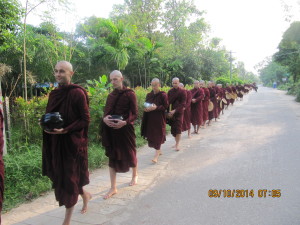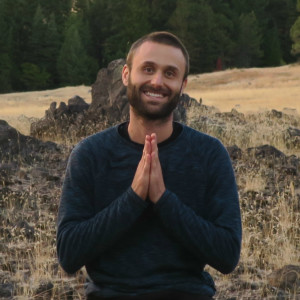
Professional Bio
A former Theravadan Buddhist monk, David Sudar completed an intensive 21-month Vipassana meditation retreat in Myanmar with his core teacher, Sayadaw U Tejaniya, and continues to spend 1-2 months a year on silent retreat. Since 2018 he has also been studying with Vipassana teacher, Carol Wilson.
David also holds a B.A. in Psychology, has completed a two-year training in Hakomi Mindfulness-Based Somatic Psychotherapy, and often weaves into his teaching his studies of Zen Buddhism and Classical Yoga. In both his work and personal life, his great passion is integrating ancient wisdom traditions with the realities of modern life. He currently works as a Buddhist & meditation teacher in Portland, Oregon.
Here is his full training & retreat CV.
A Few Fun Facts:
- I haven’t drank alcohol since 2012
- I maintain a vegan diet & lifestyle
- I don’t shop at Amazon or Walmart
- I’ve spent over 4 years across 25+ countries and speak pretty solid Spanish
- I grew up in Milwaukee, Wisconsin, though now consider Portland, Oregon home, where I live family-style with my wife, her sister, a dear friend, and our two dogs

My Story
My journey started in 2004, when I couldn’t focus due to intense ADHD, was constantly slipping in and out of apathy & depression, had little-to-no somatic or emotional awareness, was completely overrun by a sense of I’m-not-enough and I-don’t-matter (aka shame), and engaged in a number of really destructive habits, like excessive drinking and rampant passive-aggression.
Eventually, something in me started calling for a change, and I had my first big shift by way of reading the Dalai Lama’s book, “The Art of Happiness.” It offered me a view of life that completely changed what I understood as a life well-lived. Over the next several years, while completing a degree in Western Psychology, I spent my free time diving into Eastern Wisdom traditions.
In 2009, at the end of a year of social justice work in Southern Mexico, I did a one-month yoga intensive, and near the end, I had a split-second insight that forever changed the course of my life (quite literally). Like any true realization, it feels impossible to put it into words, but on a very deep level of heart & mind, I realized that I am not my thoughts, feelings, emotions, sensations, beliefs, roles, impulses or anything else I can put a word to – similarly, past and future are not “real” entities to worry about, but rather useful orienting concepts that occur in the present. To put it more simply, I learned the secret to peace in a way that’s never left me.
From there, like a snake entering a bamboo tube, there was no looking back, and in 2012 I sold all my possessions, freed myself of any obligation, and set out on an indefinite spiritual journey.
I then spent four months living at the Upaya Zen Center, studied Yoga for six months in India, and pilgrimaged around Asia doing long meditation retreats in Malaysia, Nepal and Thailand. Somewhere in that period, I encountered a short book by the Burmese monk, Sayadaw U Tejaniya, and I immediately felt a pull in my heart to go to Myanmar and ordain as a Buddhist monk under his guidance.
Then, in March 2014, I bought a one-way ticket, showed up at his monastery, traded my street clothes for a set of burgundy robes, and spent the next 21 months meditating around 15 hours a day, every day. I sometimes like to say that during that time I learned how to love myself, but another way to put it would be that I internalized the practice to a degree that it fundamentally shifted my baseline state of consciousness to “meditator’s mind.”
As the story goes, in December 2015, I disrobed, left Myanmar, and returned to laylife. I then spent seven months living on an organic vegetable farm in California, getting my hands into the Earth, living in an intentional community, and experiencing what it was like to be in relationship again.
Ever since, my personal practice has largely been about integrating these wisdom teachings with the realities of everyday life, such as work, relationship, money, balance, and making time for white space.
In the summer of 2017, I moved back to Portland Oregon, and began teaching.
As for the ADHD, shame, depression, and other issues I mentioned at the start, some of those things have completely dissolved (e.g. I’m no longer passive-aggressive, and have a pretty epic emotional & somatic awareness), while other things, like shame and apathy, haven’t completely fallen off, but they occur way less frequently and intensely, and have almost no impact on my life anymore.
However, regardless of what has dissolved or not, I increasingly believe that that is the wrong conversation. It’s so easy to idealize “getting rid of” the qualities of ourselves we find challenging, or “transcending” the difficult or unpleasant aspects of life.
Instead, what for me has been a much greater step forward, and how I learned in Myanmar to love myself, to treat other people in a way I feel good about, and maintain a steady baseline of peacefulness, has been more about using meditation to relate to myself (and others) with mindfulness, wisdom, and kindness.
When I can relate to life that way, moment after moment after moment, those challenges often take care of themselves, some dissolve entirely & some don’t, but in either case, I’m left feeling comfortable in my own skin, and able to help out in a meaningful way.
~ David Sudar, August 2019
